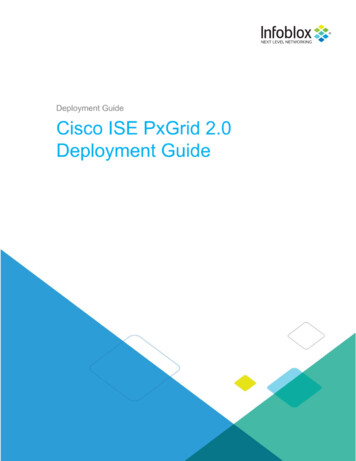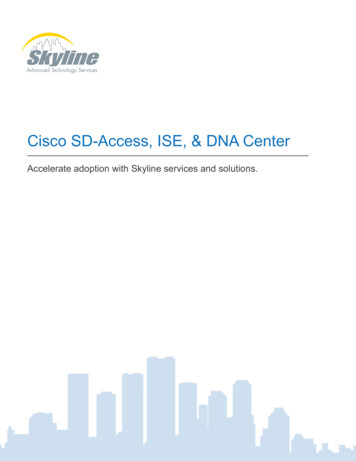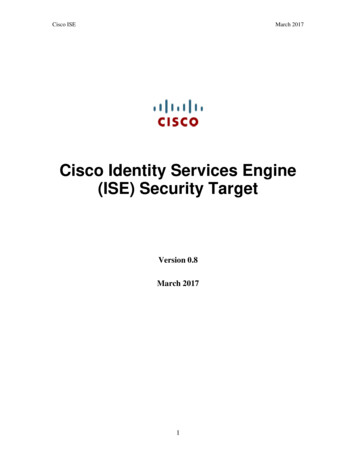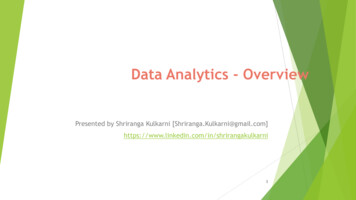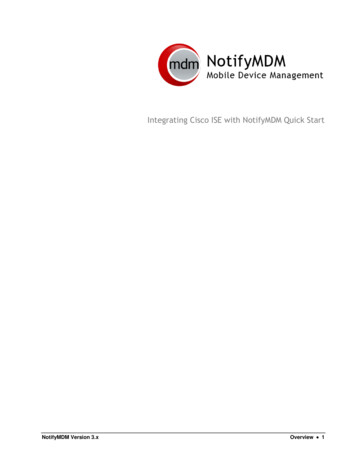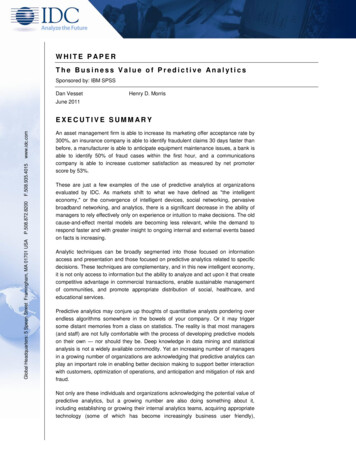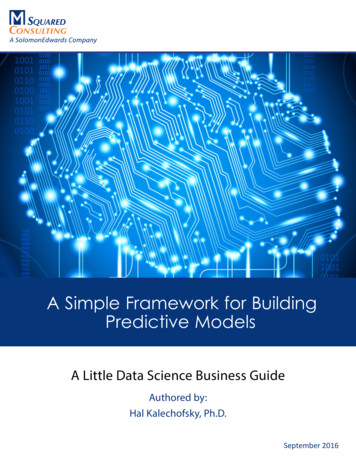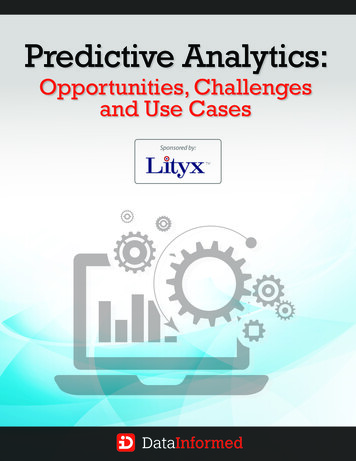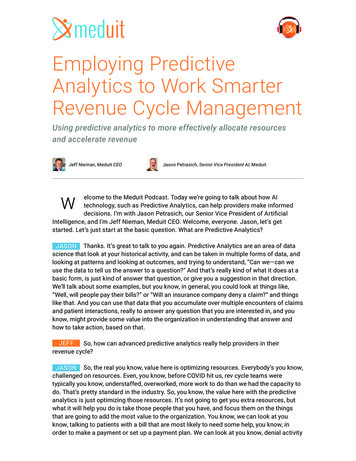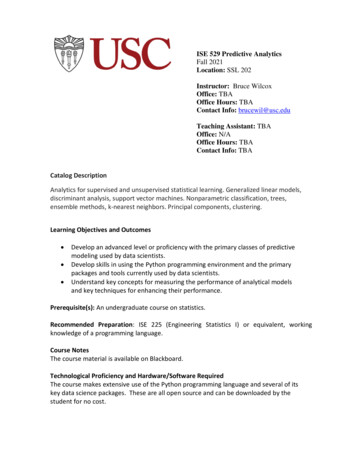
Transcription
ISE 529 Predictive AnalyticsFall 2021Location: SSL 202Instructor: Bruce WilcoxOffice: TBAOffice Hours: TBAContact Info: brucewil@usc.eduTeaching Assistant: TBAOffice: N/AOffice Hours: TBAContact Info: TBACatalog DescriptionAnalytics for supervised and unsupervised statistical learning. Generalized linear models,discriminant analysis, support vector machines. Nonparametric classification, trees,ensemble methods, k-nearest neighbors. Principal components, clustering.Learning Objectives and Outcomes Develop an advanced level or proficiency with the primary classes of predictivemodeling used by data scientists.Develop skills in using the Python programming environment and the primarypackages and tools currently used by data scientists.Understand key concepts for measuring the performance of analytical modelsand key techniques for enhancing their performance.Prerequisite(s): An undergraduate course on statistics.Recommended Preparation: ISE 225 (Engineering Statistics I) or equivalent, workingknowledge of a programming language.Course NotesThe course material is available on Blackboard.Technological Proficiency and Hardware/Software RequiredThe course makes extensive use of the Python programming language and several of itskey data science packages. These are all open source and can be downloaded by thestudent for no cost.
TextbooksThere are no mandatory texts for this class. It is intended that the PowerPoint materialspresented in class cover all of the content required. However, students are encouragedto consult the texts that the material is based on for clarification and elaboration.The theoretical material in the course is drawn from the following texts: James, et. al., An Introduction to Statistical Learning with Applications in R,Springer, 2017 (ISLR) Scmueli, et. al., Data Mining for Business Analytics: Concepts, Techniques, andApplications in R, Wiley, 2017 (DMBA)In addition, the following texts will be used as references for Python programming: Heydt M., Learning Pandas, Packt, 2017, ISBN 978-1-78712-313-7 (LP) VanderPlas, Python Data Science Handbook, O’Reilly, 2017 (PDS) Muller, Introduction to Machine Learning with Python, O’Reilly, 2017 (MLP)Description and Assessment of Assignments Eleven homework assignments (one per module) - 50% of final gradeMid-term exam – 20% of final grade (covering Modules 1 – 5)Final exam - 30% of final gradeGrading Scale (Course final grades will be determined using the following scale)AAB B95-10090-9487-8983-86BC CC-80-8277-7973-7670-72D DDF67-6963-6660-6259 and belowClass Participation: Up to 2 additional points on the overall course grade may beawarded to students based on active class participation.Assignment Submission PolicyAssignments will all be prepared and submitted using R Markdown unless otherwisedirected. They should be submitted via backboard by the due date. Email submissions andlate submissions are not allowed.Timeline and Rules for submissionAssignments are to be returned the week after submission. Solutions will be releasedsoon after the homework submission date.Syllabus for ISE 535, Page 2 of 5
Course Schedule: A Weekly BreakdownWeekDateTopics/Daily ActivitiesAssignmentsReferences18/26Module 1 HW Assigned29/2ISLR, Chapter 1DMBA, Chapter 2DMBA, Chapters 3, Module 1: Introduction to Predictive AnalyticsIntroduction to Python, Jupyter NotebookModule 2: Data Preparation and VisualizationData integration, cleaning, reduction,enhancementTools: NumPy, PandasUnivariate/bivariate analysis, data qualityassessmentTools: Pandas datareader, MatplotlibModule 3: Modeling Introduction.Statistical learning, modeling types, modelassessment and selectionModule 4: Linear Methods for RegressionTools: sklearn, statsmodelsModule 5: Linear Methods for ClassificationLogistic regression, linear discriminant analysis,and tree-based methodsModule 6: Resampling MethodsMid-Term (90 minutes)Module 7: Linear Model Selection andRegularizationModule 8: Moving Beyond LinearityGeneralized additive models, generalized linearmodels, nonparametric logistic regressionsModule 9: Tree-Based MethodsDecision trees, forests, gradient boostingModule 10: Support Vector Machines1211/18Module 11: Neural Networks13Final12/2Final Exam Review and Course WrapupFinal Exam (7:00PM – 9:00PM)12/9Module 1 HW DueModule 2 HW AssignedModule 2 HW DueModule 3 HW AssignedISLR, Chapter 2DMBA, Chapter 5Module 3 HW DueModule 4 HW AssignedModule 4 HW DueModule 5 HW AssignedISLR, Chapter 3DMBA, Chapter 6ISLR, Chapter 4DMBA, Chapter 8, 10Module 5 HW DueISLR, Chapter 5Module 6/7 HW AssignedISLR, Chapter 6Module 6/7 HW DueModule 8 HW AssignedISLR, Chapter 7Module 8 HW DueModule 9 HW AssignedModule 9 HW DueModule 10 HW AssignedModule 10 HW DueModule 11 HW AssignedModule 11 HW DueISLR Chapter 8DMBA, Chapter 9ISLR Chapter 9DMBA, Chapter 11Syllabus for ISE 535, Page 3 of 5
Statement on Academic Conduct and Support SystemsAcademic Conduct:Plagiarism – presenting someone else’s ideas as your own, either verbatim or recast in your own words – isa serious academic offense with serious consequences. Please familiarize yourself with the discussion ofplagiarism in SCampus in Part B, Section 11, “Behavior Violating University Standards”policy.usc.edu/scampus-part-b. Other forms of academic dishonesty are equally unacceptable. Seeadditional information in SCampus and university policies on scientific misconduct, , sexual assault, and harassment are not tolerated by the university. You areencouraged to report any incidents to the Office of Equity and Diversity http://equity.usc.edu or tothe Department of Public Safety c-safety/onlineforms/contact-us. This is important for the safety of the whole USCcommunity. Another member of the university community – such as a friend, classmate, advisor,or faculty member – can help initiate the report, or can initiate the report on behalf of anotherperson. The Center for Women and Men http://www.usc.edu/student-affairs/cwm/ provides 24/7confidential support, and the sexual assault resource center webpage http://sarc.usc.edu describesreporting options and other resources.Support Systems:Student Health Counseling Services - (213) 740-7711 – 24/7 on callengemannshc.usc.edu/counselingFree and confidential mental health treatment for students, including short-term psychotherapy, groupcounseling, stress fitness workshops, and crisis intervention.National Suicide Prevention Lifeline - 1 (800) 273-8255 – 24/7 on callsuicidepreventionlifeline.orgFree and confidential emotional support to people in suicidal crisis or emotional distress 24 hours a day, 7days a week.Relationship and Sexual Violence Prevention Services (RSVP) - (213) 740-4900 – 24/7 on callengemannshc.usc.edu/rsvpFree and confidential therapy services, workshops, and training for situations related to gender-basedharm.Office of Equity and Diversity (OED) Title IX - (213) 740-5086equity.usc.edu, titleix.usc.eduInformation about how to get help or help a survivor of harassment or discrimination, rights of protectedclasses, reporting options, and additional resources for students, faculty, staff, visitors, and applicants. Theuniversity prohibits discrimination or harassment based on the following protected characteristics: race,color, national origin, ancestry, religion, sex, gender, gender identity, gender expression, sexual orientation,age, physical disability, medical condition, mental disability, marital status, pregnancy, veteran status,genetic information, and any other characteristic which may be specified in applicable laws andgovernmental regulations.Bias Assessment Response and Support - (213) ponse-supportAvenue to report incidents of bias, hate crimes, and microaggressions for appropriate investigation andresponse.Syllabus for ISE 535, Page 4 of 5
The Office of Disability Services and Programs - (213) 740-0776dsp.usc.eduSupport and accommodations for students with disabilities. Services include assistance in providingreaders/notetakers/interpreters, special accommodations for test taking needs, assistance witharchitectural barriers, assistive technology, and support for individual needs.USC Support and Advocacy - (213) 821-4710studentaffairs.usc.edu/ssaAssists students and families in resolving complex personal, financial, and academic issues adverselyaffecting their success as a student.Diversity at USC - (213) 740-2101diversity.usc.eduInformation on events, programs and training, the Provost’s Diversity and Inclusion Council, DiversityLiaisons for each academic school, chronology, participation, and various resources for students.USC Emergency - UPC: (213) 740-4321, HSC: (323) 442-1000 – 24/7 on calldps.usc.edu, emergency.usc.eduEmergency assistance and avenue to report a crime. Latest updates regarding safety, including ways inwhich instruction will be continued if an officially declared emergency makes travel to campus infeasible.USC Department of Public Safety - UPC: (213) 740-6000, HSC: (323) 442-120 – 24/7 on calldps.usc.eduNon-emergency assistance or information.Syllabus for ISE 535, Page 5 of 5
An Introduction to Statistical Learning with Applications in R, Springer, 2017 (ISLR) Scmueli, et. al., Data Mining for Business Analytics: Concepts, Techniques, and Applications in R, Wiley, 2017 (DMBA) In addition, the following
